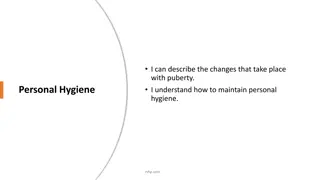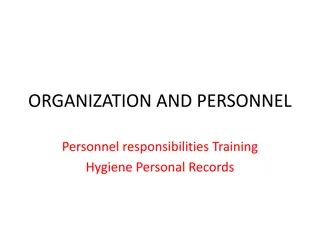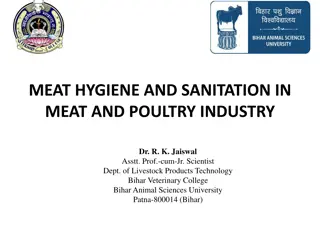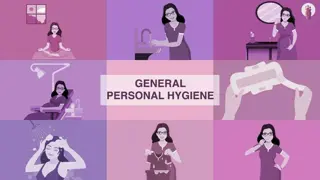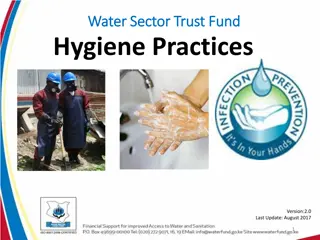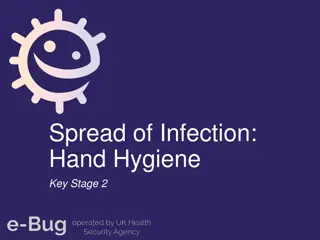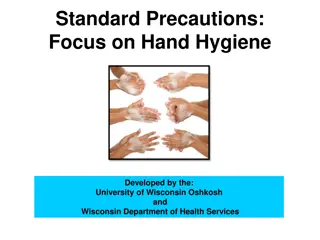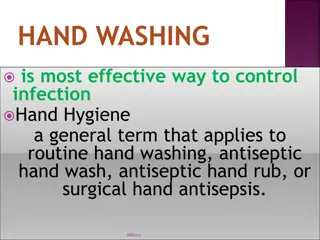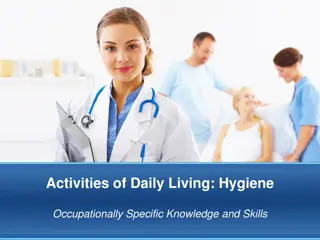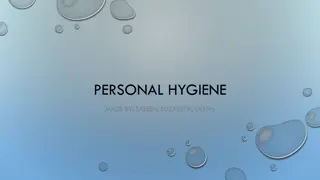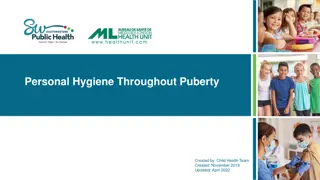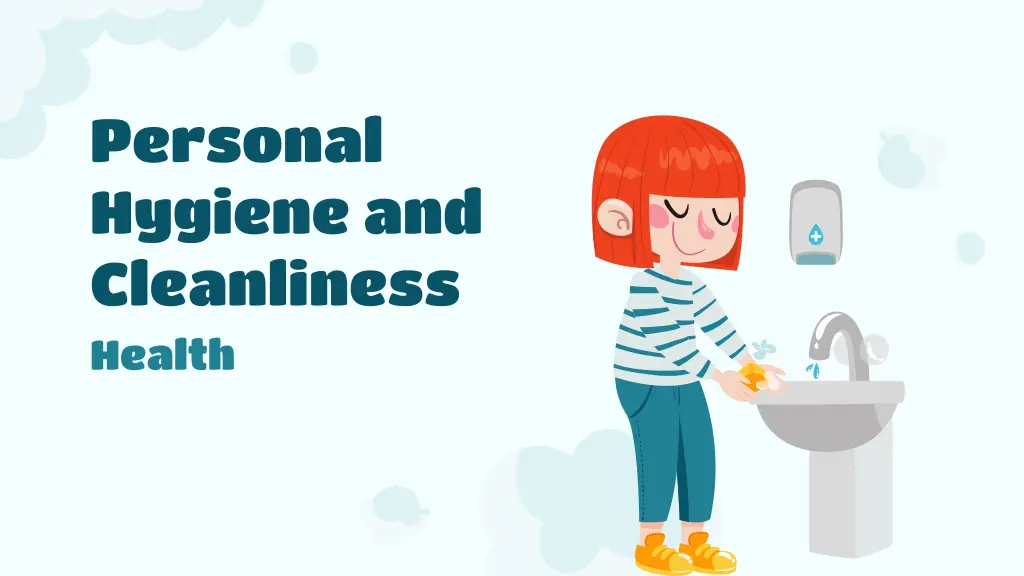
Understanding the Impact of Personal Hygiene on Health
Learn how personal hygiene practices impact overall health, including disease prevention, boosting self-esteem, and reducing the spread of germs. Discover the importance of handwashing, common myths about hygiene, and tips for enhancing your immune system naturally.
Download Presentation

Please find below an Image/Link to download the presentation.
The content on the website is provided AS IS for your information and personal use only. It may not be sold, licensed, or shared on other websites without obtaining consent from the author. If you encounter any issues during the download, it is possible that the publisher has removed the file from their server.
You are allowed to download the files provided on this website for personal or commercial use, subject to the condition that they are used lawfully. All files are the property of their respective owners.
The content on the website is provided AS IS for your information and personal use only. It may not be sold, licensed, or shared on other websites without obtaining consent from the author.
E N D
Presentation Transcript
Personal Hygiene and Cleanliness Health
Questions! 01 How does personal hygiene affect overall health? 02 Why is handwashing so important in preventing illness? 03 What are some common myths about hygiene and health? 04 How can you prevent the spread of germs in school and at home? 05 What are some ways to boost your immune system naturally?
01 How does personal hygiene affect overall health? Prevents Diseases Good hygiene reduces the risk of infections, such as colds, flu, foodborne illnesses, and skin infections. Improves Oral Health Brushing and flossing prevent cavities, gum disease, and bad breath, reducing the risk of more serious health issues like heart disease. Boosts Self-Esteem and Confidence Feeling clean and fresh improves mental well-being and social interactions. Reduces the Spread of Germs Proper handwashing and hygiene practices prevent germs from spreading to others, keeping communities healthier. Enhances Skin Health Regular bathing removes dirt, oil, and bacteria, preventing skin infections, acne, and irritation. Promotes Mental Well-being Cleanliness can reduce stress, improve mood, and contribute to a sense of well-being. Supports Healthy Lifestyle Habits Good hygiene encourages better overall self-care, including proper diet, exercise, and sleep.
02 Why is handwashing so important in preventing illness? Removes Germs from Hands People frequently touch their eyes, nose, and mouth without realizing it, allowing germs to enter the body and cause infections. Prevents the Spread of Germs Germs spread through hands, which are an entry point for bacteria and viruses. Regular hand washing reduces the risk of infection. Reduces the Risk of Illness Proper hand hygiene significantly lowers the chances of contracting diseases, including respiratory infections and diarrheal diseases. Essential in Public and Shared Spaces Washing hands after touching potentially contaminated surfaces (like doorknobs, phones, and public transport) helps minimize the spread of harmful bacteria. Specific Times to Wash Hands Important moments to wash hands include before eating, after using the restroom, after sneezing or coughing, and after touching animals. Hand Sanitizer as an Alternative While hand sanitizer kills many germs, it does not remove dirt and certain bacteria as effectively as soap and water. Better Overall Hygiene and Health Regular hand washing supports good personal hygiene, preventing infections and promoting a healthier lifestyle.
03 What are some common myths about hygiene and health? Hand sanitizer does a better job than soap and water While hand sanitizer kills many germs, it does not remove dirt, grease, or some bacteria as effectively as washing with soap and water. You only need to shower when you smell bad Even if you don t notice body odor, bacteria and sweat build up on the skin, which can lead to infections and irritation if not cleaned regularly. Brushing your teeth once a day is enough Brushing twice a day and flossing is necessary to prevent cavities, gum disease, and bad breath. You can tell if someone has poor hygiene just by looking at them Some hygiene issues, like not washing hands properly, are not always visible but can still spread germs and cause illness. Wearing the same clothes multiple times is harmless Clothes, especially socks and undergarments, collect bacteria and sweat, which can cause skin infections and odors if not washed regularly. You don t need to wash your hands if they don t look dirty Germs are invisible, and hands can still carry bacteria and viruses even if they appear clean. Mouthwash can replace brushing and flossing Mouthwash helps freshen breath but does not remove plaque and food particles like brushing and flossing do.
04 How can you prevent the spread of germs in school and at home? Wash hands regularly Frequent handwashing with soap and water helps remove germs and prevent infections, especially after using the restroom, before eating, and after coughing or sneezing. Cover coughs and sneezes Using a tissue or coughing into your elbow stops germs from spreading through the air and onto surfaces. Avoid sharing personal items Items like water bottles, utensils, towels, and toothbrushes can transfer bacteria and viruses between people. Clean and disinfect surfaces Regularly wiping down high-touch areas like desks, doorknobs, and light switches helps eliminate germs that can cause illness. Stay home when sick Resting at home prevents the spread of contagious illnesses like colds, flu, and stomach viruses to classmates or family members. Dispose of tissues properly Used tissues should be thrown away immediately, and hands should be washed to prevent spreading germs. Maintain good personal hygiene Showering regularly, brushing teeth, and wearing clean clothes help reduce the buildup of bacteria and germs on the body.
05 What are some ways to boost your immune system naturally? Eating Fruits and Vegetables Consuming foods rich in vitamins, antioxidants, and essential nutrients strengthens the immune system. Staying Hydrated Drinking plenty of water supports overall health and immune function. Getting Enough Sleep Proper rest helps the body recover and maintain a strong immune system. Engaging in Physical Activity Regular exercise enhances circulation and immune response. Managing Stress High stress levels can weaken the immune system, so relaxation techniques are important. Practicing Good Hygiene Regular handwashing, sanitization, and cleanliness help prevent infections. Avoiding Processed Foods Consuming natural, nutrient-dense foods instead of processed items supports immune health.
Thanks! 77777@gmail.com Native Body CREDITS: This presentation template was created by Slidesgo Slidesgo, including icons by Flaticon, infographics & Flaticon images by Freepik Freepik



